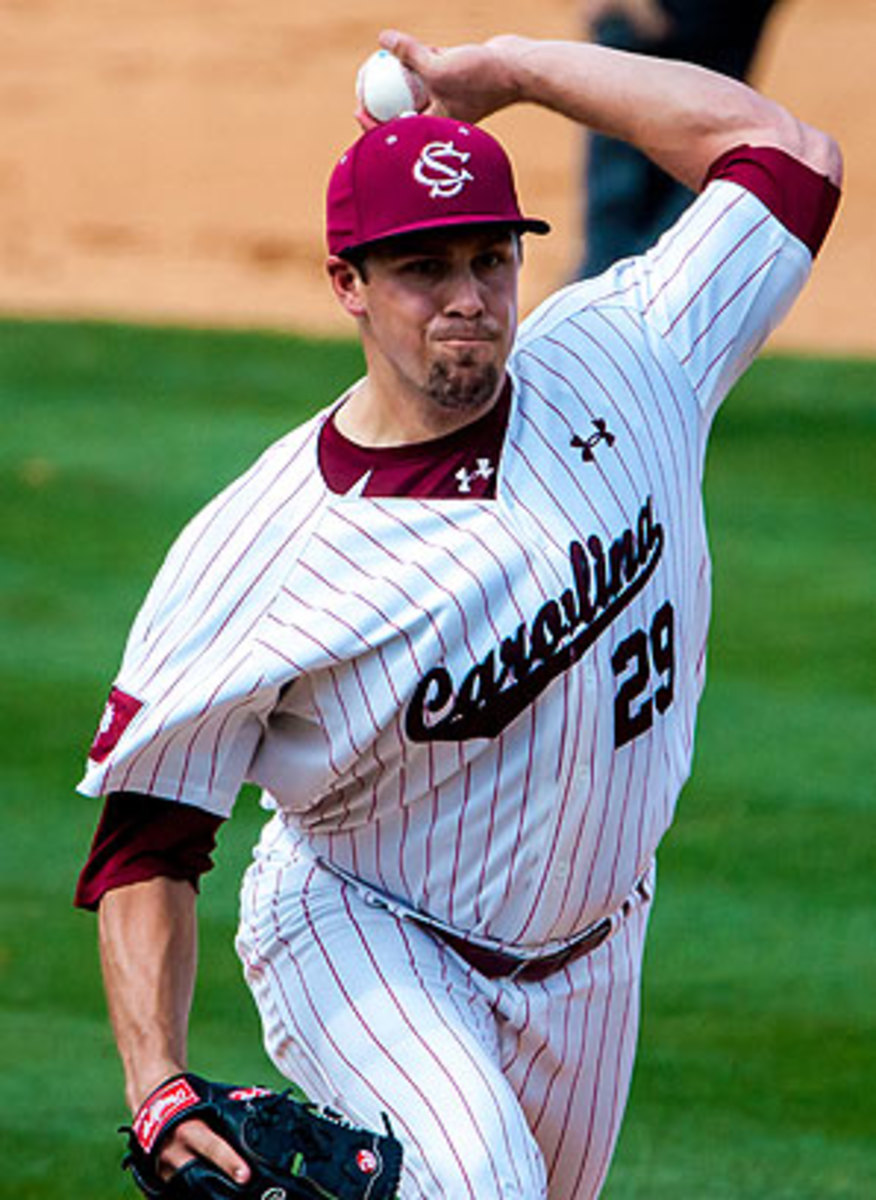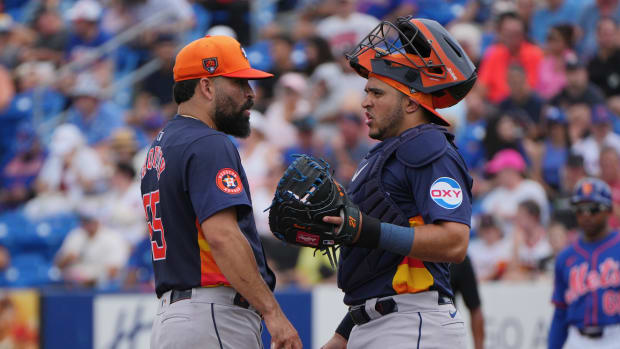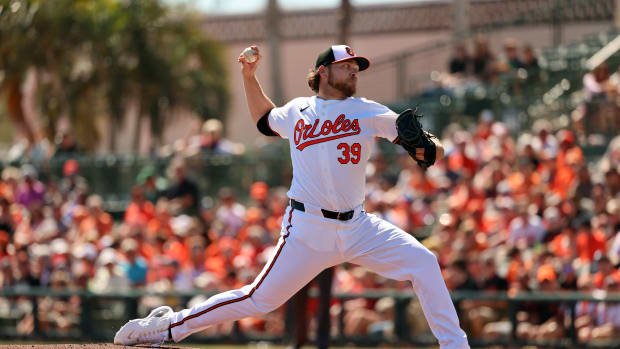
NCAA Tournament preview: South Carolina, Florida lead storylines
This is the 66th year for the NCAA Division I college baseball championship, more commonly referred to as "The Road to Omaha." It's a nod to the city that has hosted the College World Series for the past half century. At least "The Road to Omaha" is the phrase used by 63 of the 64 teams in the NCAA Tournament. For Creighton, it's "The Road to Home." The Bluejays play their home games at Omaha's TD Ameritrade Park, site of the CWS. That wouldn't make it any less special being one of the eight teams that will play for the national championship. Here's a few things to watch for as this year's journey begins:
1. South Carolina
After winning back-to-back national championships -- a feat accomplished by only six schools in the 65-year history of the College World Series -- the Gamecocks are bidding to join an even more exclusive club this season with a threepeat. Only Southern California -- which won five straight titles from 1970-74 -- has pulled that particular hat trick. Resilient and resourceful, don't bet against one USC joining the other. Although state rival Clemson, which was placed in South Carolina's regional, will have something to say about it.
2. Florida
The Gators are virtually everyone's favorite to win the title this season after finishing as the runner-up to South Carolina last year. Florida returned its starting rotation -- righthanded pitchers Hudson Randall and Karsten Whitson and lefty Brian Johnson -- intact along with an offense that has bludgeoned the opposition this year (outhomering them 67 to 27 and outscoring them 345-196). Perhaps Florida's only problem is that it received the No. 1 national seed for the tournament. No national No. 1 has won since Miami in 1999, the first year the field was expanded to 64 teams.
3. Florida State
The Seminoles, awarded the No. 3 national seed, are carrying the banner for the ACC as well as themselves. Florida State has the distinction of reaching the CWS more times (20) than any other school without winning a championship. It's indicative of the ACC's struggles. The conference hasn't had a national champion since Wake Forest in 1955. North Carolina, given the No. 6 national seed, will certainly aid in the effort to bring home a title, but it is the Seminoles and longtime coach Mike Martin (who has taken the team to Omaha in 14 of his 33 seasons) who are serving as sentimental favorites.
4. Oregon
The Oregon program was revived in 2009 after being dormant for 28 years. In four short seasons the Ducks have risen to national prominence. Of course, the pieces were put into place to realize such success. Coach George Horton was hired away from Cal State Fullerton, where he won a national championship in 2004, and a state-of-the-art ballpark was constructed to attract players. Oregon has made the most of it. The Ducks were rewarded for a 40-win season this year with a No. 5 national seed and selected as one of the host sites for the tournament. Adding to the intrigue, the NCAA selection committee placed Cal State Fullerton in their regional.
5. Purdue
The Big Ten hasn't had a team reached the CWS since the Reagan administration, when Michigan made it in 1984. Purdue, which had not qualified for the NCAA Tournament since 1987, is the conference's big hope this season to change its fortunes. The Boilermakers were selected as one of the regional host sites, a rare event in itself for a Big Ten school but a key to advancing in the postseason. Regional hosts have a 70 percent winning percentage, although Purdue is hosting at U.S. Steel Yard ballpark in Gary, Ind. -- some 90 minutes from its campus in West Lafayette -- so how much home field advantage there will be remains to be seen.
1. Mark Appel, RHP, Stanford
At 6-foot-5, the junior fits the build scouts look for in a power pitcher who can be selected at the top of the draft. His mid-90s fastball is complemented by a plus slider and change-up. Appel (9-1, 2.37 ERA, 116 SO/24 BB in 110 IP), who has been among a handful of players mentioned as a possible No. 1 overall pick in Monday's major league draft, has come into his own this season by harnessing his command.
2. Mike Zunino, C, Florida
He is expected to be the first college hitter selected in the draft -- projected as high as third overall by some observers -- and should move quickly through the professional ranks based on his talent at the plate and behind it. Zunino (.323, 16 HR, 55 RBIs) has shown uncommon power, despite recent NCAA bat restrictions. He isn't too bothered by scouts looking over his shoulder since his father, Greg Zunino, is a longtime scout who works for Cincinnati.
3. Kevin Gausman, RHP, LSU
A draft-eligible sophomore, Gausman (10-1, 2.84 ERA, 125 SO/24 BB in 107 2/3 IP) is expected to be a high first-round pick in the draft. He got by with a mid-90s fastball in high school in Colorado because that's all he needed. He's matured greatly both mentally and physically (adding 25 pounds to his frame), improved his command and added a split-change that has given hitters something else to think about at the plate.
4. Michael Roth, LHP, South Carolina
His bulldog presence is representative of the Gamecocks' general attitude. South Carolina needs his leadership even more this season after key losses to graduation. Roth (6-1, 2.58 ERA, 75 SO/31 BB in 101 IP) doesn't rate highly among pro prospects, but head coach Ray Tanner wants him on the mound when it matters most. Roth was the starting pitcher in the decisive game for both national championships.
5. Michael Wagner, RHP, San Diego
The sophomore shares the national lead in saves with 19, but the Toreros are expected to move him into the starting rotation this weekend, perhaps giving him the start in Friday's opening game of the Los Angeles Regional against New Mexico. Wagner (5-1, 2.50 ERA, 48 SO/17 BB in 54 IP) isn't overpowering with a fastball clocked in the low 90s, but he knows how to get hitters out. That could come in handy if he faces the Lobos, who are batting .333 as a team.
While it's fun to predict upsets -- by this we mean a No. 3 or No. 4 seed winning a regional -- it's also pretty much pointless. Coaches for underdog teams love to point to Fresno State, a No. 4 seed in 2008 that went on to win it all, as a "see-it-can-be-done" confidence builder. But the fact is that the Bulldogs and Missouri (in 2006) are the only No. 4 seeds ever to win a regional. That means they're 2-for-208 over the past 13 years. No. 3 seeds have had more success (they're 21-for-208), but it's still few and far between. That won't stop us from making some predictions, but we're not going too far out on the limb to reach for winners:
Gainesville Regional (1. Florida 2. Georgia Tech 3. Charleston 4. Bethune-Cookman)
Florida is favored to win the whole thing, so how do you pick against the Gators in the first round? Answer: You don't.
Raleigh Regional (1. North Carolina State 2. Vanderbilt 3. UNC Willmington 4. Sacred Heart)
Vanderbilt played well in reaching the SEC Tournament finals last week, and the Commodores have enough experience returning from last season's CWS team to advance here.
Charlottesville Regional (1. Virginia 2. Oklahoma 3. Appalachian State 4. Army)
Virginia and Oklahoma are both battled-tested, but give the edge to the host Cavaliers.
Columbia Regional (1. South Carolina 2. Clemson 3. Coastal Carolina 4. Manhattan)
South Carolina has won an NCAA-record 16 straight postseason games and the streak should reach 19 after this weekend.
Eugene Regional (1. Oregon 2. Cal State Fullerton 3. Indiana State 4. Austin Peay)
Oregon coach George Horton knows better than anyone else here what it takes to get to the next round.
Gary Regional (1. Purdue 2. Kentucky 3. Kent State 4. Valparaiso)
Kentucky uses regional snub to fuel its fire.
Houston Regional (1. Rice 2. Arkansas 3. Sam Houston State 4. Prairie View)
As usual, Rice has too much pitching (2.91 team ERA) for its opponents.
Waco Regional (1. Baylor 2. Dallas Baptist 3. UT-Arlington 4. Oral Roberts)
Baylor, which won 24 straight game during the middle of the season, is too much for this crowd.
Los Angeles Regional (1. UCLA 2. San Diego 3. New Mexico 4. Creighton)
New Mexico has one of the most potent offenses in the nation, so if there's any regional ripe for an upset it's this one.
College Station Regional (1. Texas A&M 2. TCU 3. Mississippi 4. Dayton)
TCU and Mississippi are down and Dayton (making its first NCAA Tournament appearance) is just happy to be here, setting things up for Texas A&M to advance.
Coral Gables Regional (1. Miami (Fla.) 2. University of Central Florida 3. Missouri State 4. Stony Brook)
Looking for a No. 4 seed with upset potential? Try Stony Brook, which has the nation's best winning percentage at .807 (46-11).
Baton Rouge Regional (1. LSU 2. Oregon State 3. Belmont 4. Louisiana-Monroe)
LSU will have more than 10,000 fans cheering wildly at Alex Box Stadium, which gives the Tigers a home-field advantage like few others.
Chapel Hill Regional (1. North Carolina 2. East Carolina 3. St. John's 4. Cornell)
This is the sixth time in seven years North Carolina has hosted a regional. The Tar Heels advanced on the five previous occasions. Make it six.
Tucson Regional (1. Arizona 2. New Mexico State 3. Louisville 4. Missouri)
Arizona moved its home games to Hi Corbett Field (former spring home of the Colorado Rockies) this season to position the Wildcats to host a regional. Here's where they take advantage of it.
Stanford Regional (1. Stanford 2. Pepperdine 3. Michigan State 4. Fresno State)
Stanford has stacked three of the nation's best recruiting classes on top of each other and this is where it pays off for the Cardinal.
Tallahassee Regional (1. Florida State 2. Mississippi State 3. Samford 4. University of Alabama-Birmingham)
Mississippi State caught fire last week on the way to the SEC Tournament title. The Bulldogs are still burning bright.



































